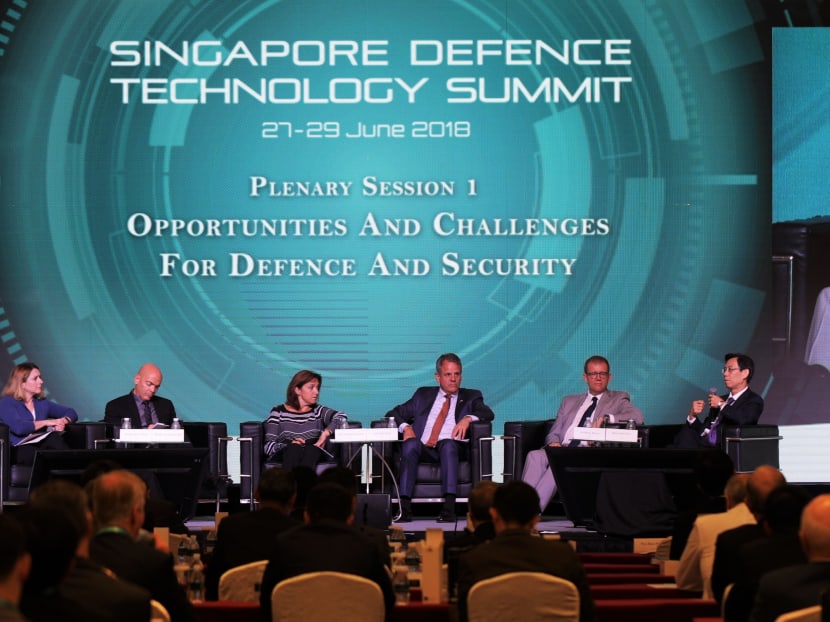Unconventional threats a ‘game-changer’ for militaries
SINGAPORE — The ease with which non-state actors can get their hands on cutting-edge technology to wreak havoc on societies is a major concern that has forced countries to adapt defence processes to meet unconventional threats.

(From left) Dr Kathleen Hicks, BG(Ret) Dr Daniel Gold, IGA Caroline Laurent, Mr Jan-Olof Lind, Dr Brian Pierce and Mr Quek Gim Pew speak at a plenary session at the inaugural Singapore Defence Technology Summit.
SINGAPORE — The ease with which non-state actors can get their hands on cutting-edge technology to wreak havoc on societies is a major concern that has forced countries to adapt defence processes to meet unconventional threats.
On Thursday (June 28), the issue took centrestage at a plenary session — consisting of high-ranking defence officials from Israel, France, the United States and Singapore, among others — at the inaugural Singapore Defence Technology Summit.
Technologies previously in the domain of government are now readily available to private firms and citizens, said Singapore's chief defence scientist Quek Gim Pew.
"The state no longer enjoys a monopoly on the use of force," Mr Quek told a 400-strong audience comprising policymakers, corporate chiefs, academics and entrepreneurs at the Shangri-La Hotel.
Beyond the conventional threats from land, air and sea, technology has resulted in the threat of cyber and information warfare.
Noting Singapore's size, Mr Quek said the country has "little if any control over the tsunami of changes that affect or even dictate our future."
"We must, therefore, be pragmatic in our response (and) exploit the advantages that smallness brings, which are the agility to respond faster, the ability to better organise and coordinate, and to test, iterate, implement and course-correct faster," he added.
Mindef will nudge planners and decision-makers to plan and manage risks and uncertainties regularly, he added.
Defence technology is a "force multiplier as well as a key enabler in the face of uncertainty", said Mr Quek.
Countries have had no choice but to change and adapt to new threats from terrorists and non-state actors, said Ms Caroline Laurent, director of the strategy directorate at France's Directorate-General for Armaments — the French armed forces' procurement agency.
For instance, explosive devices can be fitted on commercial drones that cost US$300 (S$410) to US$900. Counter-measures, such as jammers, have begun to lose their effect on these unmanned aircraft, she noted.
On the dark Web, terrorists also tend to communicate with devices unknown to the authorities, including interacting through games.
"We are able to stop the fast and high-risk type of air combat, but we are not able to stop those very low and slow threats coming on those devices," said Ms Laurent. "That's the real game-changer in the theatre… and we need to adapt to that."
It was "not that easy to think very differently", she acknowledged, as her agency still "tends to replace planes with new planes and ships with new ships".
Earlier in the day, Singapore's Deputy Prime Minister Teo Chee Hean said governments and private firms were struggling to resolve new vulnerabilities, including those thrown up by the same systems meant to address defence and security gaps.
Criminals, for instance, have seized upon drones for smuggling and corporate espionage.
He called on governments, firms and the academic community to join hands to tackle these issues, which straddle industries and national boundaries.








